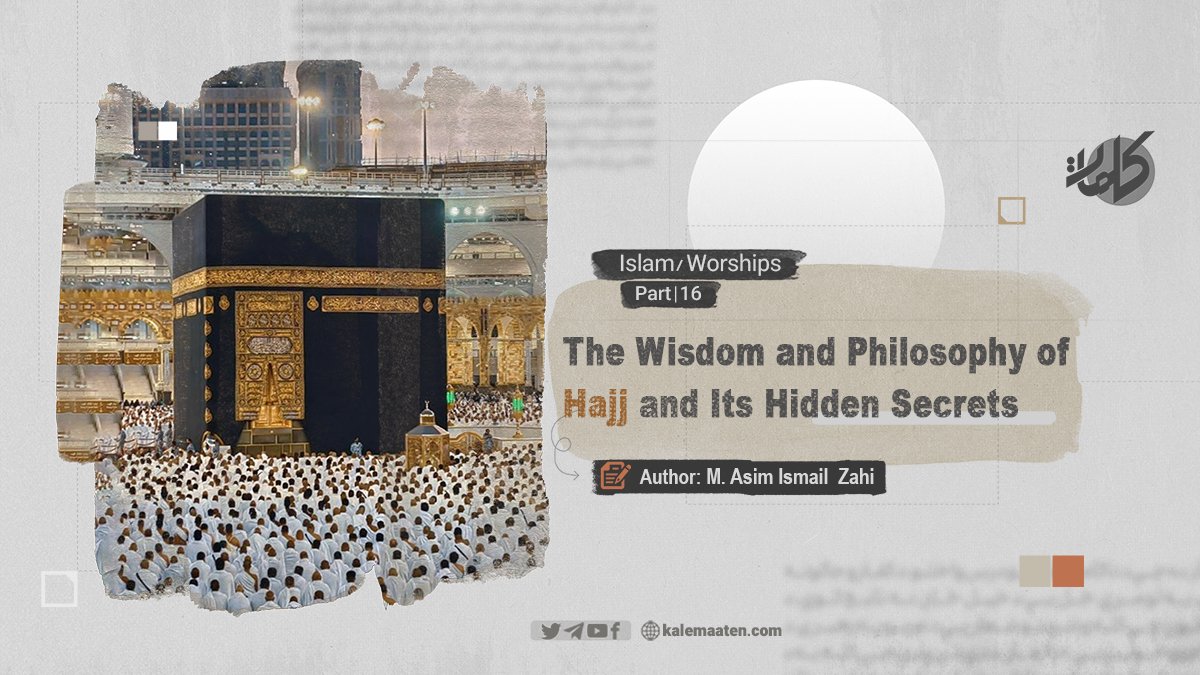
Author: M. Asim Ismail Zahi
The Wisdom and Philosophy of Hajj and Its Hidden Secrets (Part 16)
Doubts and Responses to Them
First Doubt: Why do you go for Hajj and give your money to wealthy Arabs? Why don’t you give it to the poor in your own country?
We are pleased that we go for Hajj,
Unaware that we are going astray.
We go to the Kaaba to meet God,
Unaware that God is already here.
Hajj, in truth, is nothing but a pure heart,
Not just wiping sorrow from a sorrowful heart.
A. The journey of Hajj lasts about a month. From the time a person departs from their city toward Mecca until they return home, all their expenses are covered by the amount they pay for the pilgrimage. These expenses include: Hajj travel gear (special bags, Ihram garments, etc.), visa and exit fees, transportation by bus (from the home city to the airport and back, round-trip between Mecca and Medina—about 400 km—and other local travels between the hotel and Haram during the month), airfare to and from Saudi Arabia, one-month accommodation in hotels near the Haram, three meals a day including fruits, tents and services in Mina and Arafat, the cost of a sacrificial animal, service fees and staff of the caravan, and other necessities during the month-long stay. A rough calculation shows that all this money is spent directly on the pilgrims’ trip. If viewed fairly, this amount is, in fact, the minimum cost required for a one-month trip abroad.
The cost of employing 17,000 soldiers and 3,000 vehicles to provide security, 23,000 workers (mostly foreigners) hired by the mayor of Mecca, and the preparation of 156 medical centers with more than 30,000 staff working during the Hajj season of 1440 AH—this is just a small part of the total expenses.
B. Those who perform Hajj also give alms (Zakat) and charity because both Hajj and Zakat are pillars of Islam. One pillar of Islam cannot be abandoned in favor of another. Opponents—whether out of ignorance or intentionally—present Hajj and charity as mutually exclusive, offering only one option: either Hajj or helping the poor! However, a person can perform Hajj and give Zakat and charity at the same time. There is no contradiction. Those who object to Hajj usually lack faith in it—and similarly, they don’t believe in Zakat either. Thus, such individuals have no right to raise this objection.
C. To those who criticize Hajj, why do they not object with the same passion to foreign trips to Turkey, Thailand, Europe, etc.? Why don’t they object to extravagant weddings and the absurd amounts of money spent for just a four-hour celebration? If you tell someone who travels abroad or owns an expensive car to spend that money elsewhere, the most polite response you will get is: “It’s my money; I’ll spend it however I want. Is it your business?” Then, why can’t a pilgrim going to the House of Allah say the same: “It’s my money; what business is it of yours?”
D. A portion of the Hajj expenses is allocated to sacrificing animals, the meat of which is distributed to the poor (e.g., in some African countries)—the very poor whose resources were plundered by Western colonialists, and now these same powers sarcastically ask them, “Where is your God to help you?” [We seek refuge in Allah].
E. In 2019, in the United States alone, $20.7 billion was spent on Valentine’s Day—a one-day celebration. Why don’t atheists ask on this day: “Why isn’t this money given to the poor?” As if the poor are only hungry during the Hajj season! In 2017, the total annual revenue of Saudi Arabia from Hajj and Umrah (for all pilgrims from around the world) was $12 billion. Thus, the amount spent on Valentine’s Day in the U.S. alone surpasses the total revenue from Hajj throughout a full lunar year (355 days) for all pilgrims worldwide!
Another bizarre, frightening, and ridiculous celebration in the U.S. is Halloween. In 2019, about 180 million people in the U.S. celebrated Halloween, spending $8.8 billion on it. Why doesn’t anyone calculate the costs of Halloween and the hundreds of similar celebrations and suggest giving that money to the poor instead? Isn’t it obvious by now that “caring for the poor” is just a pretext for promoting an anti-Islamic agenda?
Had Halloween been an Islamic festival, every media outlet and social network would have raised alarms about its psychological effects on children, the promotion of backwardness and barbarism under the guise of celebration, and the notion that its cost should be donated to the poor. But since it’s a Western festival, it’s not only acceptable—it’s considered classy!
An interesting point: The Guardian reported that between 2008 and 2013, $206 million was given to 33 organizations whose main goal was to promote hatred and disgust toward Islam and Muslims. If that $206 million had been spent on combating hunger in Africa, imagine the results! Yet in the eyes of Islamophobes, only the money spent on Hajj can eliminate poverty!
Continues…


